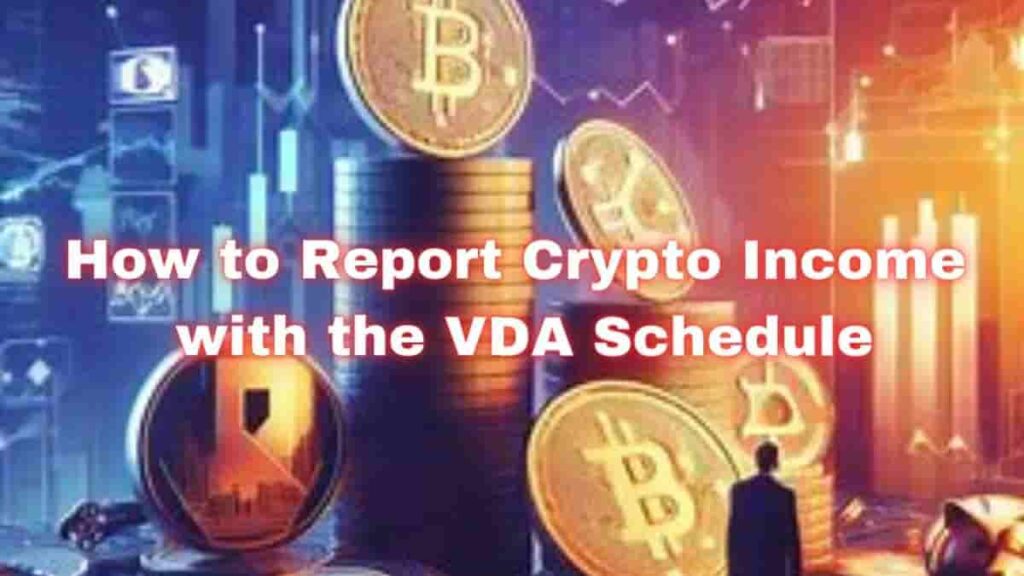{Income Tax Return (ITR) filing, Crypto income reporting, Virtual Digital Assets (VDA) schedule, Cryptocurrency taxation in India, Crypto Profit and Loss (P&L) report, Income tax compliance for crypto investors, Tax implications of cryptocurrency investments, Cryptocurrency tax calculation, VDA schedule placement, Reporting crypto income accurately}
Crypto Income Tax Reporting
In recent years, the world of cryptocurrency has grown exponentially. More people are investing in virtual assets, and governments worldwide are taking notice. India is no exception, with the Income Tax Department introducing significant changes in the assessment year 2023-24. One of the most important additions is the Virtual Digital Assets (VDA) schedule, designed to help cryptocurrency investors report their income accurately. In this blog post, we’ll delve into the details of how to report crypto income in your income tax return after the addition of the new VDA schedule.

Understanding the VDA Schedule
The VDA schedule is a game-changer for Indian cryptocurrency investors. It’s essential to comprehend the key aspects of this new schedule to ensure you report your crypto income correctly.
Taxation of Crypto Income
The Government of India has implemented a flat tax rate of 30 percent on income from virtual assets. This means that irrespective of your income level, a substantial portion of your crypto earnings will go to taxes.
Separate Records for Separate Assets
The income tax rules on virtual assets are stringent. To ensure compliance, cryptocurrency investors must maintain separate records for different currencies. Unlike traditional assets like stocks, crypto investors cannot claim setoff benefits for losses incurred on other investments. Each cryptocurrency’s income and losses must be tracked separately.
Calculating Crypto Income
Calculating your crypto income can be a bit tricky due to the 30 percent flat tax rate and the inability to offset losses. Let’s break it down with an example:
Suppose you earned ₹100 from select cryptocurrency investments and lost ₹80 on other crypto investments. In this scenario, you will have to pay 30 percent tax on the ₹100 earned from select cryptocurrencies, which amounts to ₹30. Meanwhile, in the case of other assets like stocks, you would only have to pay income tax on the net income, which, in this case, is ₹20 (₹100 – ₹80).
Other Precautions
Apart from understanding the income tax calculation rules, there are several other precautions you should be aware of. These include keeping meticulous records of all your cryptocurrency transactions, maintaining records of Tax Deducted at Source (TDS) entries, and accounting for any airdrops you receive.

How to Report Crypto Income with the VDA Schedule
Now that you have a clear understanding of the tax implications and requirements let’s explore how to report your crypto income using the new VDA schedule.
VDA Schedule Placement
The VDA schedule is inserted in Schedule CG (Capital Gains) of the Income Tax Return (ITR) form. Here, you will need to provide a quarterly breakdown of your VDA income.
Reporting Your Income
Schedule VDA in the case of ITR-3 offers two heads of income options: Capital Gains or Business Income. Taxpayers have the flexibility to choose how they report their crypto income. However, it’s crucial to note that regardless of how you report your income, only the cost of acquisition can be deducted from the sale price.
Creating a Crypto Profit and Loss (P&L) Report
The first and most critical step for taxpayers is to create a Crypto Profit and Loss (P&L) report. This report should outline all your cryptocurrency transactions, including purchases, sales, and any other income or expenses related to crypto investments. From this P&L report, you can accurately populate your ITR.
Compliance and Filing
To ensure accurate and compliant reporting, it’s recommended that you not only prepare the P&L report but also focus on compliance while filing the ITR schedules. Cryptocurrency investors with multiple transactions, numerous TDS entries, airdrops, or those looking to maximize tax savings should be especially vigilant during this process.
FAQs
Q1: What is the VDA schedule, and why is it significant for crypto investors?
The VDA schedule is a new addition to the Income Tax Return (ITR) form in India. It’s designed to facilitate the reporting of cryptocurrency income. It’s significant because it streamlines the process and ensures compliance with tax regulations.
Q2: How is crypto income taxed in India?
Crypto income in India is taxed at a flat rate of 30 percent, regardless of your income level.
Q3: Can I offset losses from one cryptocurrency against gains from another?
No, unlike traditional assets, cryptocurrency losses cannot be offset against gains from other cryptocurrencies. Each cryptocurrency’s income and losses must be tracked separately.
Q4: What records do I need to maintain as a crypto investor?
It’s essential to keep meticulous records of all cryptocurrency transactions, maintain records of Tax Deducted at Source (TDS) entries, and account for any airdrops you receive.
Q5: Where can I find the VDA schedule in the Income Tax Return (ITR) form?
The VDA schedule is located in Schedule CG (Capital Gains) of the ITR form.
Q6: Can I choose how to report my crypto income under the VDA schedule?
Yes, the VDA schedule in ITR-3 offers two options for reporting income: Capital Gains or Business Income, giving taxpayers the flexibility to choose.
Conclusion
The addition of the VDA schedule in the Income Tax Return (ITR) form for the assessment year 2023-24 marks a significant change for cryptocurrency investors in India. Understanding the tax implications, maintaining meticulous records, and reporting your income accurately are crucial steps in complying with these new regulations. While the tax rules may seem complex, adhering to them will ensure that you stay on the right side of the law and contribute your fair share to the nation’s finances.
In conclusion, crypto investors should embrace these changes with knowledge and diligence, ultimately securing a prosperous and legal future in the world of cryptocurrency
Disclaimer:
The information provided in this article, published on CryptoWini, is intended for informational and educational purposes only. It does not constitute legal, financial, or tax advice.The cryptocurrency market is dynamic, and tax regulations can change rapidly. The details and guidelines discussed in this article are accurate to the best of our knowledge as of the publication date, which is [insert publication date].
Readers are strongly advised to consult with qualified tax professionals, financial advisors, or legal experts for personalized guidance on their specific tax situations and cryptocurrency investments. Taxation laws may vary based on individual circumstances and jurisdiction, and the interpretation and application of these laws can be complex.
CryptoWini and the author do not accept any responsibility for any loss or liability incurred by readers based on the information provided in this article. It is the reader’s sole responsibility to verify the accuracy and applicability of the information, and to comply with their local tax and legal obligations.Cryptocurrency investments carry inherent risks, and readers should conduct their research and exercise caution. CryptoWini and the author are not responsible for any investment decisions made by readers.
In addition, external links included in this article are provided for reference and convenience. CryptoWini is not responsible for the content of these external websites.By reading this article, you acknowledge and accept this disclaimer.






























